May 18, 2025 | 02:35 GMT +7
May 18, 2025 | 02:35 GMT +7
Hotline: 0913.378.918
May 18, 2025 | 02:35 GMT +7
Hotline: 0913.378.918

Binh Dien Fertilizer Joint Stock Company coordinated with the Ta Keo Department of Agriculture, Forestry and Fisheries (Cambodia) to organize a workshop to evaluate and summarize the smart rice farming model in the rainy season. Photo: Le Hoang Vu.
Binh Dien Fertilizer Joint Stock Company has launched a smart rice cultivation initiative to adapt to climate change in the 2023 rainy season in 4 provinces in Cambodia including Ta Keo, Preyveng, Battambang and Banteay Meanchay. The program is conducted in collaboration with the General Department of Forestry of Cambodia, the Cambodia National Seed Center, the Department of Agriculture, Forestry and Fisheries of Cambodia's main rice-growing provinces, and the Yetak Group.
Recently in Ta Keo province, Binh Dien Fertilizer Joint Stock Company coordinated with Ta Keo Department of Agriculture, Forestry and Fisheries (Cambodia) to organize a workshop to evaluate and summarize the smart rice farming model to adapt to climate change, which attracted attendance of more than 200 farmers in the province.
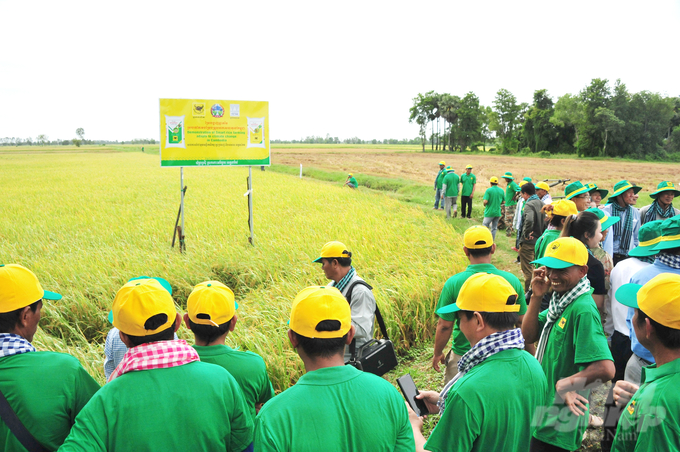
Hundreds of farmers in Ta Keo province came to visit the smart rice farming model. Photo: Le Hoang Vu.
This is the first program implemented by Binh Dien Fertilizer Joint Stock Company during the rainy season rice crop in Cambodia to assist rice producers in reducing costs and increasing profits. A pilot model was deployed at Mr. Hun Sarum's household, in Kaoh Andaet district, Ta Keo province with an area of 1 hectare, planting OM 5451 rice variety produced in the monsoon season, the yield reached 6 tons/ha, an increase of more than 900kg/ha, giving a profit of 1,533 USD/ha. This profit increased by 543 USD/ha compared to the control field.
According to Mr. Hun Sarum, this is the first time that Binh Dien Fertilizer Joint Stock Company has implemented a smart rice farming program to adapt to climate change, enabling us access many new scientific and technical advancements in rice farming. From there, it helps his family's rice cultivation reduce costs such as: reducing the amount of seeds sown from 230-250 kg/ha to 100kg/ha due to the implementation of cluster sowing, in addition to reducing the amount of fertilizer and pesticides by about 30% compared to before.
Mr. Phan Van Tam, Marketing Director, Binh Dien Fertilizer Joint Stock Company said: Soil sample analysis results indicate that soil for rice growing in Cambodia is also contaminated with alum, low pH, quite deficient in organic matter and other elements. Important nutrients such as protein, phosphorus, potassium, calcium, and magnesium. Furthermore, due to low water levels, rice cultivation depends on precipitation, and at the same time, farmers' production practices still sow very densely from 300 - 400 kg of seeds/ha, making weed management, irrigation water, and nutrition and pests management encounter many difficulties.
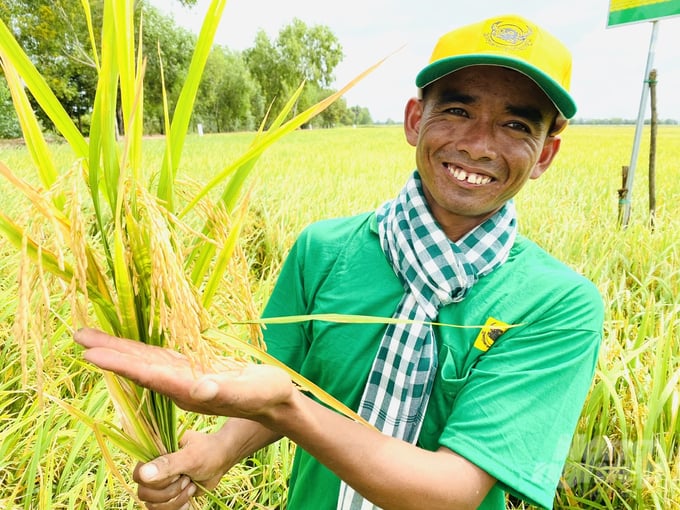
Mr. Hun Sarum, in Kaoh Andaet district, Ta Keo province, is happy to deploy a smart farming model that helps rice yield reach 6 tons/ha, an increase of more than 900kg/ha, giving a profit of 1,533 USD/ha compared to control rice fields. Photo: Le Hoang Vu.
Currently, provinces bordering Vietnam such as Ta Keo, Preyveng, Svay Rieng are converting from seasonal rice production to short-term rice production with 2 crops/year, some places are even cultivating 3 crops/year like the Mekong Delta. Therefore, to cultivate rice more effectively, farmers urgently need new, effective, and appropriate farming solutions to apply to farming. On that basis, implementation experience and solutions from the smart rice farming program adapting to climate change in the Mekong Delta are anticipated to be a solution to assist rice growers in Cambodia in achieving efficiency.
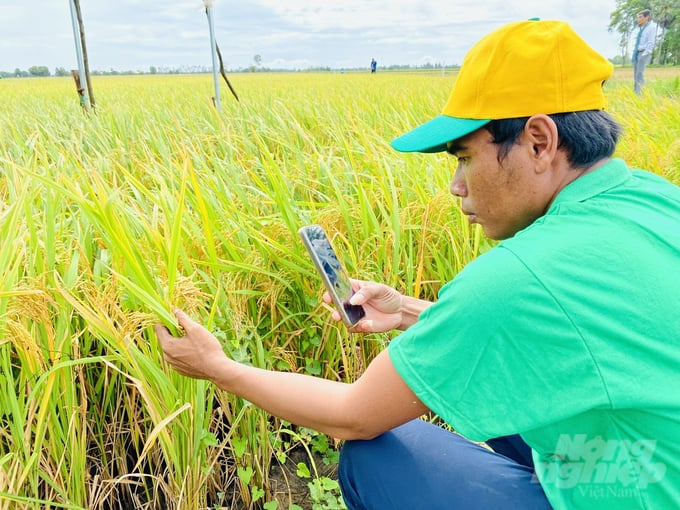
Many other farmers in Ta Keo province came to take photos and videos of the smart rice farming fields deployed by Binh Dien Fertilizer Joint Stock Company. Photo: Le Hoang Vu.
According to Tam, the model's initial steps included leveling the field's surface, meticulously silting, and constructing drainage channels to discharge alum. Reduce dry sowing or moist sowing by 100kg/ha using a cluster seeder. Effectively manage vegetation and parasites. Fertilizer designed specifically for Dau Trau Rice 1 and Dau Trau Lua 2 rice.
In the province of Preyveng, the yield reached 6.5 tons per hectare, an increase of 1 ton per hectare, and profit reached 1,322 USD per hectare, an increase of 330 USD per hectare compared to the control field. At Ta Keo, yields reached 6 tons per hectare, an increase of 900 kg per hectare, and profits reached 1,533 USD per hectare, an increase of 543 USD per hectare compared to the control field.
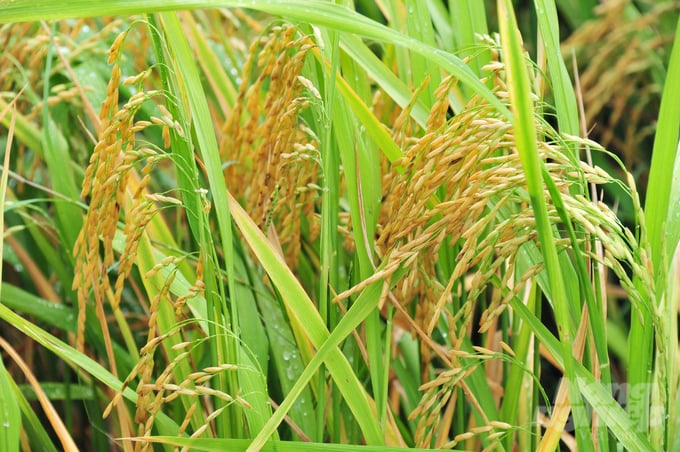
Thanks to the application of smart rice farming processes, Cambodian farmers have reduced the amount of seeds sown by nearly 150 kg of seeds/ha. Photo: Le Hoang Vu.
Alongside the implementation of the model, the program organized field visits to provide farmers with technical advice at the beginning and middle of the growing season, as well as videos instructing farmers on rice cultivation techniques. Simultaneously, a workshop was held with over 200 agricultural material merchants and 400 producers from the provinces.
Vietnamese scientists such as Prof. Dr. Nguyen Bao Ve and Dr. Ho Van Chien, along with other specialists and technical staff, accompanied and shared smart rice farming techniques with Cambodian farmers in order to equip them with a greater understanding of how to implement rice farming more effectively, thereby aiding in the enhancement of agricultural productivity.
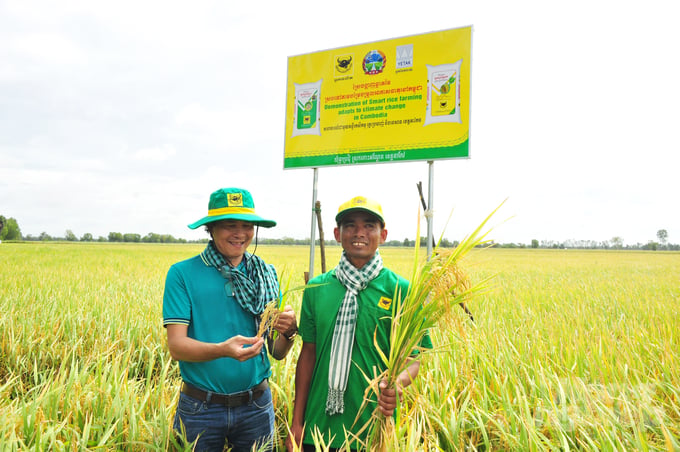
The Cambodian Ministry of Agriculture, Forestry, and Fisheries also recommends that in the coming time, major rice-growing provinces will expand the area by applying smart rice farming processes. Photo: Le Hoang Vu.
Mr. Nhep Srorn, Director of the Department of Agriculture, Forestry, and Fisheries of Ta Keo province, stated that Ta Keo is one of the provinces in Cambodia with a significant area of rice production land, typically yielding two harvests per year, particularly during the rainy season. About 180 thousand hectares are devoted to cultivation, while about 80 thousand are devoted to the dry season. The average produce during the wet season ranges between 3.4 and 3.5 tons per hectare, while the dry season yields 5 tons per hectare.
Binh Dien Fertilizer Joint Stock Company has deployed a clever rice cultivation program to Ta Keo farmers, especially during this rainy season, to help them adapt to climate change and gain access to numerous scientific and technical advancements.
Translated by Linh Linh

(VAN) Minister of Agriculture and Environment Do Duc Duy held a meeting with Soopakij Chearavanont, Chairman of C.P. Group, on May 15.
/2025/05/16/3800-0-nongnghiep-143756.jpg)
(VAN) Suntory PepsiCo Vietnam coordinated with the Ministry of Education and Training to implement an education program on water conservation, reaching nearly 1 million primary school students nationwide.

(VAN) Vietnam’s TH Group officially put its high-tech fresh milk processing plant into operation in the Russian Federation, marking a historic moment as the first TH true MILK cartons were produced in Russia.

(VAN) Use of high-quality broodstock and biotechnology is regarded as the most effective approach to ensuring sustainable and economically viable shrimp aquaculture ahead of climate change and the emergence of increasingly intricate disease patterns.

(VAN) Carbon farming is a form of agricultural practices that helps absorb more greenhouse gases than it emits, through smart management of soil, crops, and livestock.

(VAN) This is a key content of the Memorandum of Understanding recently signed between the Vietnam Fisheries Society and Kunihiro Inc of Japan.

(VAN) To achieve the goal, local authorities and businesses in Kon Tum province have fully prepared the necessary conditions for the new Ngoc Linh ginseng planting season.